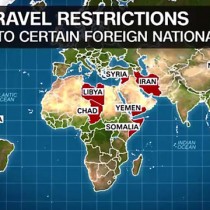
Supreme Court should dismiss travel ban case due to changes, DOJ says
Trump's executive order in March -- part of which the Supreme Court allowed to go forward this summer -- temporarily banned travel from six Muslim majority countries. That expired late last month and was replaced with a different travel ban. As a result, the administration says challengers need to start over in lower courts.
"If the court were to continue to" hear the appeal, Solicitor General Noel Francisco wrote in a filing Thursday, "it would be asked to decide questions with no ongoing practical import."
Francisco also argued that the justices should dismiss the current case and wipe away lower court decisions that went against the administration, "given the implications of the decisions below for the President's ability to conduct foreign affairs and protect national security."
The Supreme Court was scheduled to hear oral arguments on the March travel ban next week. Justices postponed that hearing and asked both sides to respond to the question of whether the case should be moot.
Justices are scheduled to meet behind closed doors Friday for their regular conference and could discuss the latest filings.
The March ban barred residents of six Muslim-majority countries -- Iran, Syria, Libya, Sudan, Somalia and Yemen. The new restrictions cover eight countries -- Chad, Iran, Libya, North Korea, Syria, Venezuela, Somalia and Yemen. The restrictions, tailored to the individual countries, generally go into effect by October 18.
Challengers said there's no reason to dismiss the current case.
"The government cannot come close to meeting its heavy burden" to "demonstrate that the bans will not be revived," wrote Neal Katyal, the lead lawyer representing the challengers from the state of Hawaii. He said that the court should "once again set the case for argument and adjudicate the legality of the President's ongoing effort to usurp Congress's power over immigration and unilaterally ban hundreds of millions of foreign nationals -- the overwhelming majority of them Muslim -- from the United States."
Katyal pointed out that one provisions concerning a temporary ban on entry may have expired, but another section barring refugees was still in place.
However, if the court were to dismiss the case, Katyal said, it should leave the lower court decisions in place. He accused the government of slow walking its appeal.
"It would be profound inequitable to permit the government to control the timing of the case in this manner and then to use any resulting mootness to obtain the very relief it sought on the merits: vacatur of the injunction," he wrote.
The ACLU's Omwar Jadwat argued that Trump's latest ban continues to represent "potential permanent separation from loved ones, including spouses, children, parents and siblings."
"It continues to send the President's message of condemnation of Islam, a religion that he said 'hates us.' "Jadwat wrote.
Legal experts have said for days that they thought the latest travel ban might derail the current case.
"In general, when one policy expires and a new policy is developed, the court may consider any challenge to the expired policy to be moot," said Irv Gornstein, the executive director of the Supreme Court Institute at Georgetown Law. Gornstein stressed he was talking generally, but he suggested that if the parties are no longer affected by the new policy, or its impact has changed, there may not be the injury that is necessary to establish a case -- potentially meaning things will have to start anew.
Source-www.krcrtv.com
Leave a comment
| Copyright © 2009 - 2024 Sunatimes News Agency All Rights Reserved. |
| Home | About Us | Diinta | Reports | Latest News | Featured Items | Articles | Suna Radio | Suna TV | Contact Us |
 0
0 









Supreme Court should dismiss travel ban case due to changes, DOJ says
(CNN) - The Justice Department told the Supreme Court Thursday that it should dismiss challenges to President Donald Trump's travel ban because the administration replaced parts of it last month.